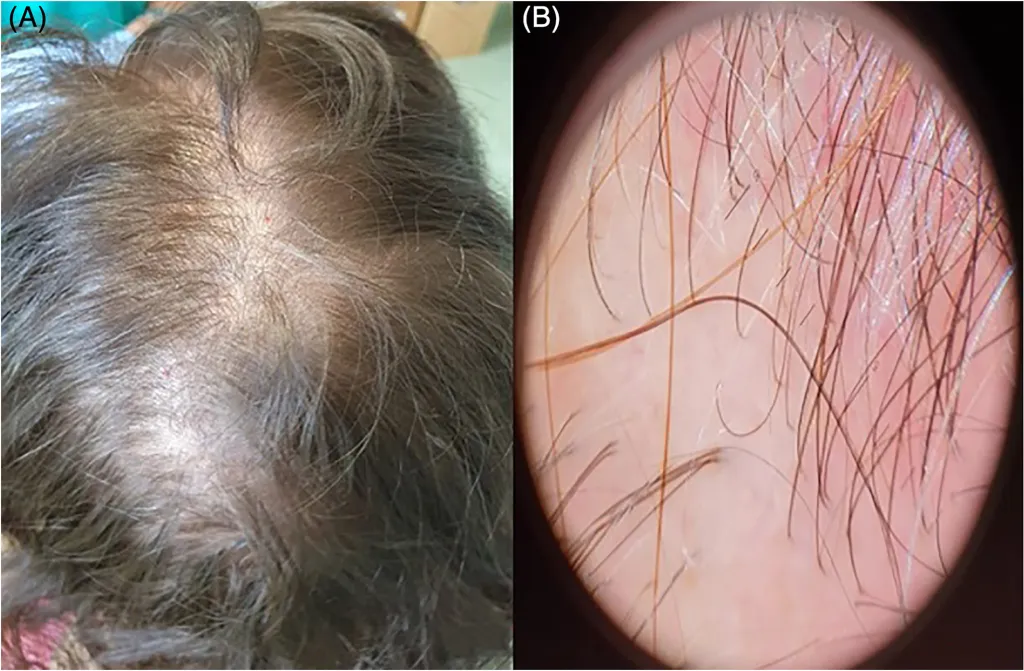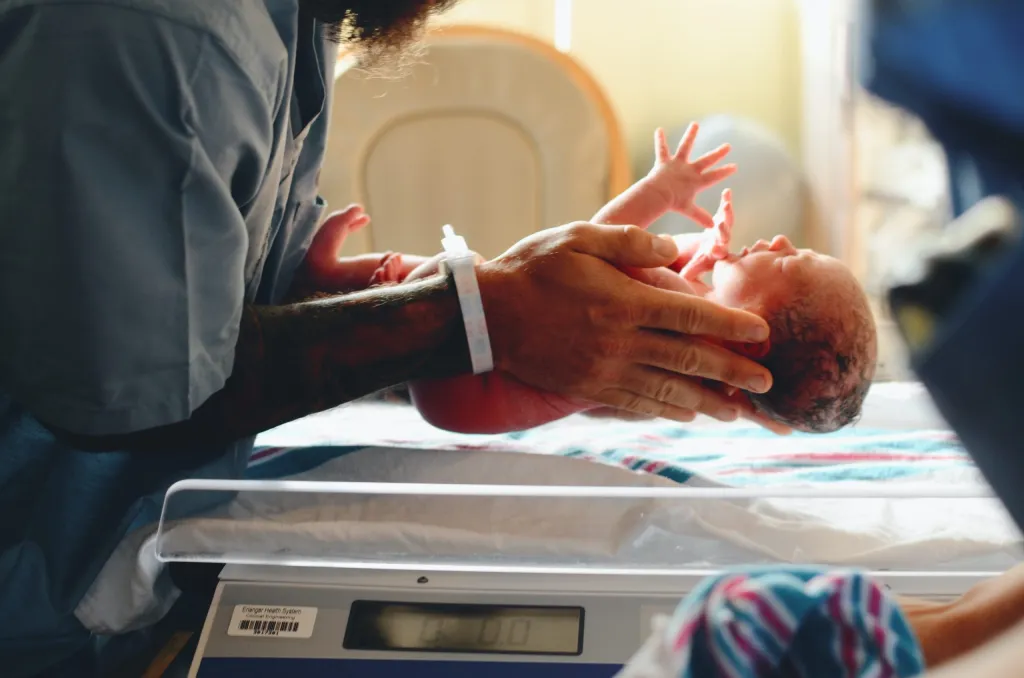
In this post, we are going to look at PCOS-related hair loss, how to stop and prevent it from occurring. We’re going to do that by discussing hormone balance because that’s really what I think it boils down to. There are some other factors as well such as nutrients, etc. So if you are somebody who is suffering from PCOS and hair loss, this information should be helpful to you.
What really causes hair loss in PCOS?
There really isn’t just one cause of hair loss in any individual. This applies to everyone but especially with PCOS. Once we realize that hair loss is probably a symptom of some other issue then we can start to figure out what is causing it.
PCOS is really a hormonal or endocrinological disorder. This means that the symptoms associated with PCOS are manifestations of that hormone imbalance. Usually, there are several of them.
What are some of the types of hair loss that can occur among patients with PCOS?
You may realize that you may have one or more of these, so it’s not like you have one and then you don’t have to worry about any of the others. You might have a combination of two or more of these types of hair loss. It can be very difficult to discern what is actually going on and understanding the exact cause is important because that affects your treatment.
1. Female pattern hair loss, usually abbreviated FPHL
This is a very very common type of hair loss that women get. It’s so common in fact, that up to about 40% of women will have some element of this type of hair loss by the time they reach 50. And the incidence only goes up from there. The incidence means the number of people that have the issue.
What may sound crazy is that we really don’t know what causes this hair loss. The general scientific consensus researchers, physicians, dermatologists have is this type of hair loss falls into the androgenetic alopecia subgroup. It does appear that there’s some genetic component to this type of hair loss that increases the sensitivity of the hair follicles to androgens.
As we know in PCOS, estrogen is converted into androgens which affect different organs and is responsible for acne, irregular menstrual cycles, hirsutism in addition to hair loss. The excess circulating androgens, specifically dihydrotestosterone (DHT), affect the hair follicles causing miniaturization of the hair, which means that the hair that grows back is thinner. The affected hair strands grow back thinner with each cycle till they no longer grow back leaving areas devoid of hair.
There is an increased incidence of this type of hair loss among women who have PCOS.
How do you know if you have FPHL?
Generally, you can discern what type of hair loss you have based on the distribution of hair loss that occurs on your head. I’ve included an image here that goes over exactly how this looks like.

You can see it has a characteristic Christmas tree-like pattern. So you can see that these lines would be equivalent to the Christmas tree. It doesn’t exactly look like that but hopefully, you get the picture. Generally, it starts with you shedding some hair, and then it gets worse. Then the crown of your head starts to become more visible as hair loss continues and it gets worse and worse.
Androgens play a role in both female and male pattern hair loss. The bottom line here is that women with PCOS have a high risk of developing female pattern hair loss or androgenetic alopecia. This type of hair loss is secondary to the excess conversion of testosterone to DHT.
DHT happens to be a more potent androgen than testosterone is. Women with female pattern hair loss tend to convert testosterone into DHT at a higher rate than others. Also, partly due to genetic predisposition, their hair follicles are more sensitive to DHT. This doesn’t explain everything but it may explain part of the reason why women get FPHL loss when they have PCOS.
One of the hallmarks of PCOS is the elevation of androgens which is really just a fancy word for saying testosterone and dehydroepiandrosterone (DHEA). The ovary is responsible for the high androgens in PCOS. If you have a lot of testosterone and a fair amount of it is being converted to DHT, that may explain why some women with PCOS develop FPHL.
2. Male pattern hair loss
Some women with PCOS develop male pattern hair loss due to the same reasons as FPHL.
We all know what male pattern hair loss looks like because we’ve seen men with it. Basically, it starts with a receding hairline, and then a bald spot develops at the top of the head. Or hair loss starts at the temples and the hairline recedes backward. Women can develop that as well.
3. Chronic telogen effluvium
This refers to a diffuse loss of hair across the entire head. There’s no pattern like the other ones but it’s a dramatic and substantial loss or shedding of hair that occurs all over the entire head. It tends to occur fairly rapidly. There is an inciting event that occurs like the sudden death of a loved one, burns, traumatic injury, surgery, etc. Following this, the woman starts to shed hair like crazy and then they lose up to 50% of their total volume of hair is gone in about a three-month time period. Hair loss is fairly traumatic, especially for women. Hair is important from a cosmetic standpoint and this is the cause of extreme anxiety. I’ve had many patients come to me with this sort of issue and they’re obviously concerned about it.

There’s acute telogen effluvium and that basically just means it comes and then the hair loss stops by 6 months and grows back within a year. In chronic telogen effluvium, you shed about 50% of your hair and it just doesn’t really grow back. You don’t really see any increase in hair growth and the hair just stays very sparse. This can also happen to women with PCOS.
4. Hormone induced hair loss
Several of your hormones especially thyroid hormone and the estrogen: progesterone ratio can impact your hair. You might know this intuitively. If you’ve ever been pregnant before, your hair usually grows thicker. A couple of weeks after you have your baby, you start to have a lot of shedding and your hair starts to get thinner. You’ll notice when you’re pregnant estrogen tends to make the hair more shiny and thick and full. It might even change the characteristics of it, making it more or less wavy or curly.
Thyroid hormone deficiency can do the same thing. High levels of dehydroepiandrosterone – sulfate (DHEA-S) can occur in tumors and disorders of the adrenal glands. Hence, it is important to rule out both thyroid and adrenal gland disorders when dealing with hair loss in women.
Generally, hair loss is not taken as a very serious symptom when physicians are confronted with it. It makes sense because there are more potentially life-threatening issues that could take up their time. But it doesn’t mean that it should be ignored because it’s a symptom that has an impact and I would say a significant impact on the overall quality of life of the woman who’s dealing with the issue. And I think for men too. Men come are also really concerned about their hair loss and they’ll do whatever it takes to keep their hair.
I want to point out that it’s not necessarily important that you have high levels of testosterone or DHEA to have hair loss in PCOS. We know that women can develop hair loss even with so-called normal testosterone and DHEA levels. So you have to do a couple of things. First of all, you need to break down the testosterone levels when you order them in your labs. You want to look at your total and your free testosterone because what is happening in your body is that the free testosterone is available to bind to your cells. So if you have a high level of free testosterone, you may be flooding your hair follicles with free and available testosterone which then may cause the issue. If that is causing hair loss in you, reducing that free testosterone is important.
But there’s one other thing that we need to think about and that is from a genetic standpoint, certain individuals are just very sensitive to testosterone in general and this is where I think you probably get the androgenetic hair loss component.
So if you are a woman that has obviously elevated free and total testosterone and you’re having hair loss, that’s probably related to that testosterone and you probably have a male pattern hair loss.
If you are a woman that has hair loss mostly in the female pattern distribution, then it’s more likely sensitivity of your hair follicles to any amount of testosterone. I guess the bottom line is it’s possible that women can still have hair loss despite having so-called normal testosterone and DHEA levels.
What are you supposed to do if you have this type of hair loss?
Before we go into the treatment, we need to look at ways to balance these hormones. These are what I would call the basics. I’m posing a series of questions here that I want you to just think about and answer internally. If you haven’t done these things, then you’re probably going to get the biggest bang for your buck by doing these things first. Now it doesn’t mean you can’t use some of the supplements that I’m going to discuss below. It just means that you’re probably not going to see the success you’re looking for until you’ve managed these five things. So let’s go over these.
1. Are you managing your stress?
If your stress is not being managed, then whatever you do the benefits are going to be limited. Stress can cause hair loss? Absolutely! It’s a very well-known trigger that has to be dealt with. There are many ways that you can handle stress. You need to be managing your stress by either avoiding it or doing things that help in stress relief.
2. Are you eating healthy and is your diet in order?
If you’re not sure how to do this I have a post here. It’s a guide for the foods women with PCOS should be eating. You need to remember that your diet has to be in order.
3. Are you reducing the amount of refined sugar that you eat?
I put specific emphasis on sugar because it has the greatest impact most likely on insulin. And insulin is something that women with PCOS are very sensitive to. Sugar intake increases insulin secretion which then causes high testosterone and high DHEA. So you have to limit your sugar intake.
4. Are you exercising regularly?
If you are not exercising you need to be doing it regularly. You must be careful not to over-exercise. If you are somebody that’s going to the gym for one to two hours per day, constant spin classes every single day, that’s probably too much for your body. You might be causing more harm than good in that way and paradoxically the treatment for you to manage that is to reduce the amount you exercise. I know it sounds strange but many patients that actually do a lot better after we cut down the amount of time they exercise, if they are over-exercising.
5. Are you sleeping enough?
Getting adequate sleep can help manage your stress. It helps manage your hormones too.
These are the basics that you need to be doing.
Managing high testosterone and androgens
1. Weight loss
Losing weight will help balance these hormones probably more than anything else. I understand telling you just to lose weight is not necessarily an easy thing, you may be in a situation where your excess weight is causing imbalances that are causing PCOS-related hair loss. It doesn’t mean you have to go on some crazy diet but it does mean that you need to be thinking about weight loss.
2. Reduce or reverse insulin resistance
At present the reason for that is simple. Insulin resistance is one of the triggers of high testosterone and high androgen. We know that insulin resistance and blood sugar play a very important and critical role in developing some of the symptoms of PCOS. So that’s got to be treated. You can do that with exercise, dietary intervention, and intermittent fasting.
3. Using supplements specific to reducing testosterone and DHEA
Saw palmetto and zinc are such supplements. They can help you reduce the conversion of testosterone into DHT. If you are somebody that has high free testosterone, taking saw palmetto and zinc may be of benefit to you. The way that it would help with your hair loss is because it would be reducing those androgens which would then potentially reduce your PCOS-related hair loss.
4. Resistance training to increase your muscle mass
This helps in reducing your insulin resistance. I’m not necessarily talking about spin or high-intensity interval training, I’m talking about building lean muscle mass. Don’t worry about bulking up or anything like that. The point here is to sensitize your body to insulin. Obviously reducing the consumption of carbohydrates and refined sugars and then using all these things together with those lifestyle recommendations I already discussed above, will make things easier for you.
Managing thyroid dysfunction
It’s not well known among women with PCOS that the thyroid gland may be playing an important role in a lot of their symptoms including weight gain and acne and especially PCOS-related hair loss. There’s a connection between these two conditions. This means that thyroid disease, specifically hypothyroidism can lead to polycystic ovaries.
This is important because if you have PCOS for any length of time that’s going to ultimately increase your risk of developing thyroid disease somewhere down the line. This is not something that I think many people are aware of or even necessarily looking for. It might be something that you may have missed right in your treatment.
Essentially what you want to do if you have thyroid disease is restore your T3 levels to normal. If you normalize your T3 then you will improve your thyroid function. That will probably be the biggest and most effective thing that you can do to reverse hair loss if it’s caused by thyroid disease. Therapies that improve your total and free T3 like synthetic thyroid hormones are prescribed by your doctor.
You want to make sure your doctor rules out Hashimoto’s thyroiditis which is an autoimmune disease of the thyroid gland. This is important because women with PCOS tend to have a higher incidence of Hashimoto’s thyroiditis.
The high estrogen levels in PCOS are thought to be responsible for the higher incidence of autoimmune disorders in this condition. Your doctor orders anti-TPO antibodies and anti-thyroglobulin antibodies that can diagnose Hashimoto’s thyroiditis.
Balancing estrogen and progesterone
Like testosterone pretty much every woman with PCOS is going to have some issue with this ratio of estrogen to progesterone. Usually with PCOS, what happens is you have high estrogen and low progesterone. The wider the gap between the two, the more robust your symptoms are.
You can focus on certain things with the goal of reducing estrogen and increasing progesterone. Increase your consumption of Brassica or cruciferous vegetables like cabbage, broccoli, cauliflower, brussel sprouts, etc. These naturally help regulate and metabolize estrogen in your body.

They contain glucosinolates, the precursors of isothiocyanates and indole-3 carbinol believed to have anti-cancer properties. The anticancer effect of indole-3-carbinol on breast cancer is likely due in part to their effects on the metabolism of estrogen by induction of 2-hydroxylation of estradiol, resulting in nonestrogenic metabolites.
Also, indole-3-carbinol can bind to the estrogen receptor (ER), represses ER signaling, downregulates the expression of estrogen-responsive genes, and thus prevents the development of estrogen-enhanced cancers including breast, endometrial and cervical cancers.
Glucosinolates however may inhibit iodine uptake and thyroid hormone formation, particularly in the event of an existing iodine deficiency. Eating cruciferous vegetables in moderation, cooking them, and adequate iodine intake can reduce these effects.
Another effective tool is actually losing weight. Losing weight can reduce estrogen. The more fat cells you have in your body, the more effective your body is at converting androgens into estrone, a form of estrogen. If you are a woman with PCOS who is 10 kg overweight, you have high androgens and you have high estrogen. So what your body is going to be doing with that extra weight, the extra fat cells you have – it’s going to be taking the excess androgens you have and converting it into even more estrogen. So you have this vicious cycle that can occur in women with PCOS.
I think it’s also worth considering evaluation and treatment for progesterone resistance. Basically what happens is that your cells become more resistant to the effects of progesterone. But it can be treated by flooding those receptors with more progesterone. The whole goal here is to balance those hormones to optimize the amount of hair that you have.
Optimizing base nutrients in your body
These nutrients play an important role in the hair cycle. The most important of these is ferritin which is a marker of iron stores in your body. We know that women who have female pattern hair loss have ferritin levels which are on average lower than women who would be considered normal healthy controls. Women with PCOS have a higher risk of developing female pattern hair loss.
Ferritin is interesting in that it is a surrogate marker for iron stores in the body. Hence it’s very effective for diagnosing this condition. Treat low ferritin and even if it’s low normal, with the goal of getting it to at least in the 60-70microgram per liter range. You can do this by supplementing with iron and folic acid. One thing to keep in mind is that ferritin is also an acute-phase reactant, which means that ferritin levels can be falsely high in inflammatory conditions.
Some nutrients and trace minerals like selenium, biotin, choline, and silicon play an important role in the hair growth cycle. These are found in most hair, skin, and nail vitamins. It doesn’t hurt to take these for a couple of months just to replete those stores because it can be difficult to test for some of these.
Use of certain medications
Medications definitely have their place in being used to treat hair loss but I don’t think you should rely heavily on them before trying all the other options discussed above and addressing the root cause which is hormone imbalance. Generally, when you use a medication whatever benefit you obtain, that benefit is going to be lost once you stop using the medication. It’s not a permanent solution. However, if you have tried all of the above without any success, then medication can be helpful.
Minoxidil which is FDA approved for the treatment of hair loss in both men and women can be applied to the scalp. It is available in both liquid and foam formulations. It’s available over the counter at places like Costco and even online on Amazon. Hair regrowth occurs within 6-8 months of usage. It is effective in 65-80% of people with androgenic alopecia.
Spironolactone is anti-diuretic that has anti-androgen properties. It is prescribed at low doses to women with PCOS who have hirsutism and FPHL. It shows improvement in many women with these symptoms. Women should not take spironolactone if they are thinking of getting pregnant as it can cause fetal malformations.
If you do all these therapies there’s a high chance that you’ll see some improvement. But there are some women, somewhere between 5 and 10% of women that will have a very difficult time trying to get all their hair back to the way that it was previously.
So just realize that there are some of you out there, that might have these underlying genetic issues which we don’t really quite understand how to treat at this point. But taking this approach of balancing the hormones, replenishing the nutrients, and then potentially using some medications is probably one of the most effective strategies that you can utilize to get back the hair that you had previously.
Thick or thinning hair, you are still beautiful. Remember YOU ARE NOT YOUR HAIR!
What type of hair loss do you have? What has helped you? Comment below.



